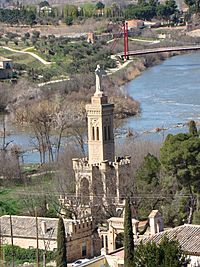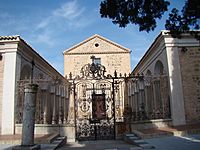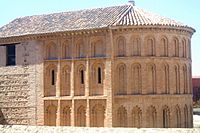Ermita del Cristo de la Vega facts for kids
The Ermita del Cristo de la Vega is a small, historic chapel in the city of Toledo, Spain. A chapel like this is also called a hermitage, which is a quiet place for prayer and worship.
This building has a very long history. It was first built in the 7th century on the ruins of an even older church from the time of the Visigoths. The Visigoths were a group of people who ruled Spain many centuries ago.
The name "Vega" means "plain" in Spanish. The hermitage is located in a flat, low-lying area of Toledo called the Vega Baja. This area was once the city's cemetery.
Contents
A Building with a Long History
The site of the hermitage has been important for centuries. Famous saints like Saint Ildefonsus, Saint Leocadia, and Saint Eugenius were once buried nearby. Their remains were later moved to other locations.
Important Church Meetings
During the Visigothic period, when the building was a large church, it was the location of the "Councils of Toledo". These were important meetings where bishops and church leaders gathered. They would discuss and make decisions on religious rules and laws.
Rebuilding the Hermitage
Much of the original building was destroyed during the Spanish War of Independence in the early 1800s. However, one very old part survived: the beautiful apse (a half-domed area at one end of the church), which was built in the Mudéjar style. This style was created by Muslims who lived in Christian parts of Spain, and it mixes Islamic and European designs.
The hermitage was rebuilt between 1816 and 1826. It was then that it became the building we see today, dedicated to the Cristo de la Vega (Christ of the Plain).
Art and Legends
Inside the hermitage, there is a famous sculpture of Jesus Christ on the cross. What makes this sculpture special is that one of its hands is free from the nail.
This detail is connected to a well-known local legend. The story, written down by the famous writer José Zorrilla, is called "A good judge, a better witness". The legend tells of a miracle involving the statue, making it a beloved part of Toledo's culture.
See also
 In Spanish: Ermita del Cristo de la Vega para niños
In Spanish: Ermita del Cristo de la Vega para niños
 | Bayard Rustin |
 | Jeannette Carter |
 | Jeremiah A. Brown |




